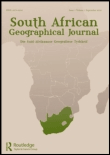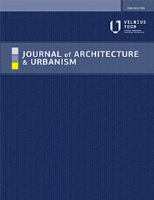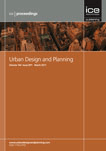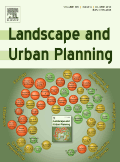
Ri Vista-Ricerche per la Progettazione del Paesaggio
Scope & Guideline
Connecting Nature and Architecture for a Sustainable World
Introduction
Aims and Scopes
- Ecological Landscape Design:
The journal emphasizes the importance of ecological principles in landscape design, advocating for plant communities, biodiversity, and sustainable practices that harmonize with natural systems. - Cultural and Social Engagement:
Research often explores the relationship between landscapes and cultural narratives, addressing how landscapes can reflect and influence societal values and identities. - Interdisciplinary Approaches:
The journal encourages collaboration across disciplines, integrating insights from ecology, architecture, urban planning, art, and sociology to enrich landscape design practices. - Innovative Design Methodologies:
There is a focus on experimental and creative design methodologies that challenge conventional practices, promoting new ways to engage with and conceptualize landscapes. - Water Management and Design:
A significant area of research addresses the role of water in landscape architecture, exploring its aesthetic, ecological, and functional contributions to urban and rural environments. - Community Participation and Co-design:
The journal highlights the importance of involving local communities in the landscape design process, advocating for participatory approaches that empower residents and reflect their needs.
Trending and Emerging
- Biophilic and Ecological Design:
There is a growing emphasis on biophilic design principles that integrate natural elements into urban settings, promoting well-being and environmental sustainability. - Water-sensitive Urban Design:
Recent themes focus on innovative approaches to water management in landscapes, addressing challenges such as drought, flooding, and water quality through design. - Community Resilience and Adaptation:
Research is increasingly centered on how landscapes can foster community resilience in the face of climate change, social challenges, and urbanization. - Participatory Landscape Planning:
Emerging themes highlight the importance of participatory design processes that engage communities in shaping their environments, reflecting a shift towards inclusivity in landscape architecture. - Cultural Landscapes and Identity:
There is a trend towards exploring cultural landscapes, emphasizing how design can reflect and reinforce community identities and narratives, particularly in urban contexts. - Transformative Landscapes:
Recent publications explore transformative landscapes that adapt to changing ecological, social, and economic conditions, showcasing innovative design strategies for regeneration and renewal.
Declining or Waning
- Traditional Landscape Aesthetics:
There has been a noticeable decrease in publications centered around traditional notions of beauty in landscape design, indicating a shift towards more functional and ecological considerations. - Monocultural Planting Practices:
Research on monocultural planting has diminished, as the journal increasingly promotes naturalistic and diverse plant communities that enhance ecological resilience. - Historical Landscape Analysis:
While historical perspectives remain valuable, there is a waning interest in papers that focus solely on historical analysis without integrating contemporary design challenges or ecological considerations. - Urbanization Impacts without Solutions:
Papers that merely document the impacts of urbanization on landscapes without proposing innovative design solutions or community engagements have become less frequent. - Static Landscape Models:
The journal has moved away from static models of landscape design, favoring dynamic and adaptive strategies that respond to changing environmental and social contexts.
Similar Journals

South African Geographical Journal
Shaping policy through rigorous geographical research.The South African Geographical Journal, published by Routledge Journals, Taylor & Francis Ltd, is a leading scholarly platform dedicated to advancing research in the fields of geography, planning, and development. With an impressive history spanning from 1931 to 2024, this journal not only retains its relevance in the academic community but also proudly holds a Q2 rank in both Earth and Planetary Sciences and Geography, Planning and Development, marking it as a significant contributor to the scholarly discourse. The journal is ranked in the top 32% of its category within Scopus, affirming its stature among researchers and professionals. Although it currently does not offer Open Access, the journal provides a critical forum for the exchange of ideas, methodologies, and findings, encouraging dialogue that informs policy and practice in the geographical sciences. Readers can expect a rich variety of articles that encompass both theoretical and practical aspects of geography, making it essential for academics and practitioners alike.

Journal of Architecture and Urbanism
Illuminating Pathways for Sustainable Urban DevelopmentThe Journal of Architecture and Urbanism, published by VILNIUS GEDIMINAS TECH UNIV, stands as a pivotal resource for scholars and practitioners in the fields of architecture and urban studies. Since its inception in 2012, the journal has committed to advancing research and discourse on the design, planning, and functionality of urban environments, reflecting a dedicated focus on contemporary challenges in architecture and urbanism. With an impressive open access model implemented since 2018, it ensures that innovative research is accessible to a global audience, fostering collaboration and knowledge exchange. The journal boasts a commendable reputation, categorized in the Q2 quartile for Architecture and Q3 in both Geography, Planning and Development and Urban Studies as of 2023, while maintaining respectable Scopus rankings. Addressing key themes from sustainable design to socio-economic impacts on urban spaces, the journal aims to inspire new models and solutions that meet the evolving needs of growing urban populations. This is a must-read for anyone engaged in the intersection of architecture and urban development.

Proceedings of the Institution of Civil Engineers-Urban Design and Planning
Shaping the Landscape of Urban PlanningProceedings of the Institution of Civil Engineers-Urban Design and Planning is a leading scholarly journal published by EMERALD GROUP PUBLISHING LTD, dedicated to advancing knowledge and innovation in the fields of urban design and planning. With an ISSN of 1755-0793 and E-ISSN 1755-0807, this journal serves as a vital platform for researchers, professionals, and students to disseminate impactful studies and findings. It boasts impressive rankings, including Q1 in Architecture and notable positions in Civil and Structural Engineering and Urban Studies, underscoring its significance in the academic community. The journal's scope encompasses a diverse array of topics relevant to urban environments, encouraging interdisciplinary dialogue and exploration. Although it operates under traditional access, its contributions are invaluable, reflecting the latest developments and challenges within urban planning practices. Published regularly since 2009, the Proceedings of the Institution of Civil Engineers-Urban Design and Planning is vital for those seeking to enhance their understanding of sustainable urban development and design methodologies, making it a critical resource in its fields of study.

ACE-Architecture City and Environment
Innovating for a Greener, More Inclusive Urban LandscapeACE-Architecture City and Environment, published by Universitat Politècnica de Catalunya in Spain, serves as an essential repository for innovative research and insights that intersect the fields of architecture, urban studies, and environmental planning. Since its establishment as an Open Access journal in 2006, it has facilitated widespread accessibility to scholarly work, fostering a collaborative and inclusive academic community. The journal has consistently maintained a prominent standing within its field, reflected in its 2023 Quartile rankings—, Q3 in Geography, Planning and Development, and Q2 in Urban Studies. With a publication horizon extending from 2011 to 2024 and an impressive Scopus ranking among peers, it offers a comprehensive platform for researchers to disseminate their findings and engage with contemporary challenges in urban environments. ACE is pivotal for professionals and students alike, striving to shape the future of sustainable architecture and urban planning through rigorous scholarship.

Cuadernos de Vivienda y Urbanismo
Shaping Sustainable Futures in Housing and UrbanismCuadernos de Vivienda y Urbanismo, published by the Pontificia Universidad Javeriana, Facultad de Arquitectura y Diseño, serves as a vital platform for researchers and practitioners in the fields of urban studies and planning. With a focus on the intricate relationships between housing, urban development, and social dynamics, this journal aims to foster interdisciplinary discourse and present innovative research that addresses contemporary urban challenges. Although its coverage on Scopus has been discontinued from 2012 to 2019, it continues to be an informative resource for understanding urban phenomena, evidenced by its rankings in the 24th percentile in Urban Studies and the 10th percentile in Geography, Planning and Development. Scholars and professionals are encouraged to explore the rich repository of articles that reflect both local and global contexts, providing insights that inform policy and practice in urban environments.

LANDSCAPE AND URBAN PLANNING
Navigating the complexities of urbanization and conservation.Landscape and Urban Planning is a premier academic journal published by Elsevier, dedicated to the interdisciplinary study of urban environments and landscape management. With a strong focus on ecological, managerial, and policy-driven aspects of urban and landscape planning, this journal has achieved a remarkable recognition within its field, boasting a Q1 classification in multiple categories, including Ecology, Urban Studies, and Nature and Landscape Conservation, as evidenced by its impressive Scopus rankings. Researchers can access state-of-the-art studies and innovative methodologies that address contemporary challenges in urbanization and environmental sustainability. Since its inception in 1986, the journal has been instrumental in shaping the discourse on landscape and urban planning, making it an essential resource for academics, professionals, and students alike who seek to contribute to the sustainable development of urban areas. The journal's accessible content, backed by a strong editorial board and rigorous peer-review process, ensures that published findings remain at the forefront of research in these critical disciplines.

METU Journal of the Faculty of Architecture
Elevating architecture research to new heights of excellence.METU Journal of the Faculty of Architecture is a reputable academic publication dedicated to advancing research and discourse in the field of architecture. Published by MIDDLE EAST TECHNICAL UNIVERSITY in Turkey, this journal serves as a vital platform for scholars and practitioners, addressing both theoretical and practical topics relevant to contemporary architectural studies. With an impact factor that positions it in the Q3 category for architecture as of 2023, and a Scopus rank of #133 out of 189 in Engineering Architecture, the METU Journal is an influential resource for innovative ideas and studies. Encompassing a wide range of scholarly articles, it fosters academic collaboration between researchers and professionals, making it essential reading for anyone passionate about the evolution of architecture. Though not open access, it provides crucial insights and rigorous research from 2008 up until 2024, contributing significantly to the global discourse on architectural practices and theories.

i2 Investigacion e Innovacion en Arquitectura y Territorio
Connecting research and real-world applications in dynamic landscapes.i2 Investigacion e Innovacion en Arquitectura y Territorio is a leading open-access journal published by the University of Alicante, dedicated to advancing research and innovation in the fields of architecture and territorial development. Since its inception in 2013, this journal has aimed to provide a robust platform for scholarly discourse, promoting interdisciplinary approaches that connect academic insights with practical applications in urban planning and environmental design. With its commitment to accessibility, the journal ensures that cutting-edge findings and case studies are readily available to researchers, professionals, and students alike, fostering collaboration and informed decision-making. As the landscape of architecture and geography continues to evolve, the i2 journal stands out as a crucial resource for enhancing knowledge and cultivating innovative practices in these dynamic fields.

Landscape Architecture and Art
Transforming Spaces with Artistic InsightsLandscape Architecture and Art is a distinguished journal published by the Latvia University of Life Sciences and Technologies, specializing in the intersection of landscape architecture, environmental design, and the visual arts. Established in 2016, this journal has rapidly garnered recognition in various academic categories, achieving Q3 ranking in Agricultural and Biological Sciences (miscellaneous), Q4 in Geography, Planning and Development, and notably Q1 in Visual Arts and Performing Arts as of 2023. With its ISSN 2255-8632 and E-ISSN 2255-8640, the journal provides an essential platform for researchers, professionals, and students to explore innovative approaches and sustainable practices in landscape design and conservation. Although currently not open access, the journal's commitment to high-quality research is evident through its impressive Scopus rankings, particularly in the Arts and Humanities with a commendable 88th percentile for Visual Arts and Performing Arts. Located in Jelgava, Latvia, this journal serves as a vital resource for advancing knowledge and fostering collaboration in the fields of landscape architecture and environmental stewardship.

Open House International
Connecting Ideas in Architecture, Planning, and GeographyOpen House International is a distinguished peer-reviewed journal that serves as a vital resource in the fields of Architecture, Urban Studies, and Geography, Planning and Development. Published by Emerald Group Publishing Ltd, the journal circulates valuable insights and research findings that address contemporary challenges and innovations within urban environments. With an impressive 2023 Scopus ranking that places it in the Q2 category in Architecture and Q3 in Geography, Planning and Development, the journal is recognized for contributing significantly to scholarly discourse. Although it follows a traditional access model, the journal's commitment to curating high-quality content remains paramount. As it transitions into a new decade of publishing, from 2007 to 2024, Open House International continues to attract submissions that push the boundaries of knowledge in urban and architectural studies, engaging researchers, professionals, and students alike in the vibrant dialogue on the built environment.